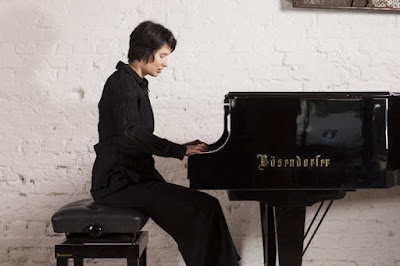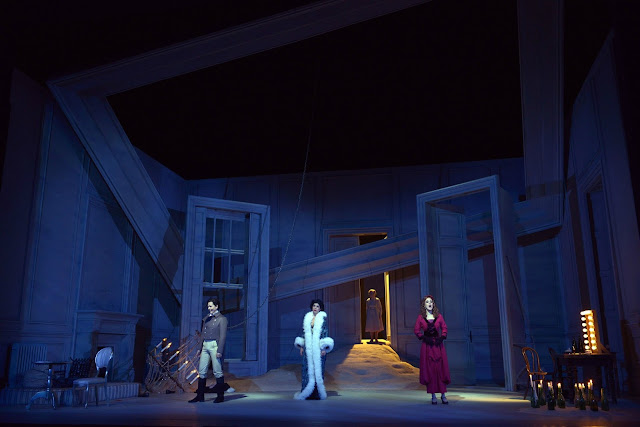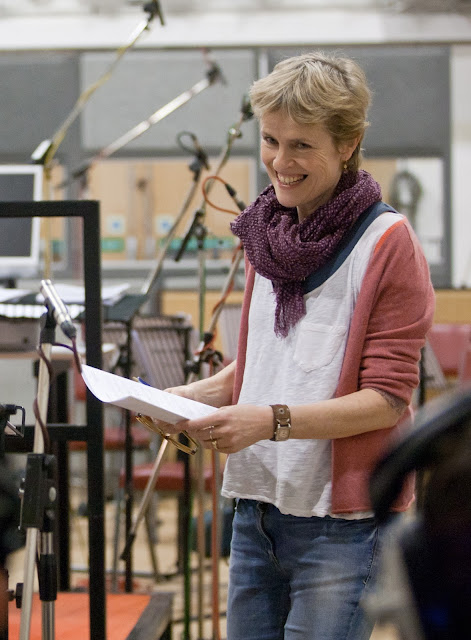 |
| Louis Langrée & Cincinnati Symphony Orchestra |
 |
| Sebastian Currier |
Cincinnati Symphony Orchestra has its origins in the 19th century but it has always looked to the present (and future) with collaborations with a remarkable number of composers. Under Louis Langrée, music director since 2013, this is continuing as the orchestra has issued a new disc Concertos for Orchestra, on its own Fanfare Cincinnati label, devoted to three contemporary composers Sebastian Currier. Thierry Escaich and Zhou Tian. I caught up with Louis Langrée via Skype to find out more.
It is an ambitious and brave project, a disc devoted to three new substantial works by contemporary composers and Louis points out that the works were recorded live. The recordings were made at the world premiere performances, capturing the excitement and fear (sometimes) of the occasions. Louis admits that whilst performers can really embrace a piece when they have played it 15 times, there is a lot to be said for the way a recording of the first performance can really capture the buzz of the premiere.
 |
| Zhou Tian |
The new works are part of larger scale ambitions, as Louis thinks that is is their duty as interpreters to commission new works, and important that as a great institution there is an area of experimentation. In the last three years he has conducted 12 first performances with the Cincinnati Symphony Orchestra, a striking figure for a symphony orchestra with a regular season with subscribers.
But from its founding the orchestra was committed to music of its time, working with Respighi, Varese, Elgar (who came to conduct
The Dream of Gerontius), Stravinsky, Bartok, Scriabin, Saint-Saens, Bernstein and Copland, whose
Fanfare for the common man was a Cincinnati commission. Last season
John Adams came to conduct his
Scheherazade.2 for violin and orchestra, the first time he had conducted the work after the premiere in New York two weeks previously when
Alan Gilbert conducted the work.
For the
Concertos for Orchestra disc Louis wanted to have three different composers from three different cultures and different musical backgrounds. Louis did not originally know the work of American composer Sebastian Currier, but the orchestra gave him pieces to read and he thought 'wow'. Currier's music was intense, visceral and very challenging to the orchestra, requiring individual virtuosity and creating a real concerto for orchestra.
Zhou Tian lives in the USA but is from China and Louis feels that though his musical language is Western, Zhou Tian's roots inflect his musical language. Louis describes Zhou Tian as a young man, but one who knows how to orchestrate, how to make an orchestra really sound.
 |
| Thierry Escaich |
Thierry Escaich is the only composer with whom Louis had worked before. Louis talks about the way there are two traditions of composers in France, the pianists (Debussy, Ravel, Boulez) and the organists (Franck, Faure, Messiaen, Durufle, Gounod), adding that Berlioz fits in elsewhere! Louis feels that Escaich fits into the tradition of organists writing symphonic music, and that his conception of the orchestra comes from the way of using registrations in organ playing. Louis adds that this does not mean that Escaich music is written for the organ and then orchestrated, but that the way he uses density, different layers and groups of players is like an organ player using stops. In Escaich's piece for Cincinnati his use of Bach chorales in the music mixes the sacred and the symphonic in a way which Louis feels is typical of this tradition of organist composers.
And the fact that organists are some of the only instrumentalists in the Western Classical tradition to continue improvising is important too. Escaich is evidently an amazing improviser and Louis thinks you can feel this in his writing. Not that the music lacks structure, but there is feeling of immediacy, the way new ideas can take the music in a different direction.
They are three very different pieces, and Louis is proud that the orchestra has commissioned them. The disc was intended to be concertos for orchestra, a form which Louis associates with the Cincinnati Symphony because the first time he really listened to them (before he had conducted them) was on a disc conducted by Paavo Järvi of
Concertos for Orchestra by Bartok and Lutoslawski, He thought it a wonderful recording and was very impressed, and when he became music director of the orchestra he had that recording in his head. He thought to ask the composers of the present day what they have to say in the form, not a symphony but a concerto for instrumentalists.



































%20in%20The%20Merry%20Widow.%20Credit%20Mihaela%20Bodlovic.%20(2).jpg)

%20in%20Trial%20by%20Jury.%20Credit%20Mihaela%20Bodlovic..jpg)

.jpg)
%20Britten%20Pears%20Arts%20(1).jpg)


